1.e4 P.Svidler.
1...c5
2.Nf3 d6 3.c3
Nf6 4.Be2 Nbd7
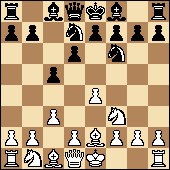
5.d3 P.Svidler:
Kasparov's second Yuri Dokhoian said in the press-centre around this moment, 'If we start analysing c3&d3
Sicilians we won't get anything serious done'. My point exactly.'
5...b6
6.O-O Bb7
7.Nbd2 g6 8.d4!?
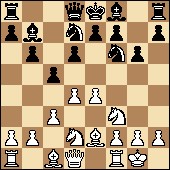
cxd4
|
|
[8...Qc7 9.e5!
dxe5 10.dxe5 Ng4
|
| |
(10...Nxe5 11.Nxe5
Qxe5 12.Bb5+ Nd7
13.Nf3 Qd5 14.Qxd5
Bxd5 15.Bxd7+!
Kxd7 16.Rd1 ) ) |
|
11.e6
|
| |
(11.Qa4 h5 12.h3
Bc6 13.Bb5 Bxb5
14.Qxb5 a6 15.Qa4
Ngxe5 16.Nxe5
Qxe5 17.Qc6 (17.Nf3
b5) 17...Rd8 18.Nf3
Qd6 19.Qb7 Nb8
20.Bf4 Qxf4 21.Rad1
Nd7 22.Rxd7 1/2-1/2
Seret,JL-Pinter, France 1992) |
|
11...fxe6 12.Bc4
Bd5
|
| |
(12...e5 13.Ng5) |
|
13.Qa4 P.Svidler: 'White is better
in all the lines:'
13...Ngf6
|
| |
(13...h5 14.h3
Ngf6 (14...Bg7
15.Bxd5 exd5 16.hxg4
b5 17.Qa6! ) 15.Ng5) ) 15.Ng5) |
|
14.Ng5 Qf4
15.Nde4 Qf5
|
| |
(15...Qe5 16.f4
Qf5 17.Ng3
Qg4 18.Be2
Qh4 19.c4
h6 20.cxd5
hxg5 21.dxe6
Qxh2+ 22.Kf2 ) ) |
|
16.Re1 Nxe4
17.Nxe4 Bxc4
|
| |
(17...Bxe4 18.Bb5 ) ) |
|
18.Qxc4 Bg7
19.Ng5 Qd5
20.Qa4 e5
21.Rd1 ] ] |
9.cxd4
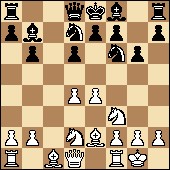
Nxe4?! P.Svidler:
'The most principal answer, but White seems to be doing OK after it.'
|
|
[9...Bg7 10.e5
|
| |
(10.Bd3 O-O 11.b4
e5 (11...a5!?) (11...a5!? P.Svidler) 12.Bb2
d5 ) ) |
|
|
| |
(10.d5 O-O 11.Re1
Nc5 12.Bf1
e6 13.dxe6
Nxe6 14.e5
dxe5 15.Nxe5
Qc7 16.Ndf3
Rad8 17.Qa4 Degraeve-Nepomnishay,
St. Petersburg 1996 P.Svidler: 'White was able to equalize in Degraeve-Nepomnishay, St.Petersburg 1996') Degraeve-Nepomnishay,
St. Petersburg 1996 P.Svidler: 'White was able to equalize in Degraeve-Nepomnishay, St.Petersburg 1996') |
|
10...dxe5 11.dxe5
Nd5 12.e6
|
| |
(12.Re1 O-O 13.Bc4
e6!? (13...Rc8
14.e6 fxe6
15.Rxe6) 14.b3
b5 15.Bf1
Nc3 16.Qc2
Rc8 ) ) |
|
12...fxe6 13.Ne4!
|
| |
(13.Ng5 Nc7 (13...Nf4
14.Nde4 Bxe4 (14...Nxe2+
15.Qxe2 Bd5 ) 15.Nxe4 (15.Bxf4
Bd5 ) 15.Nxe4 (15.Bxf4
Bd5 ) 15...O-O 16.Bg4
Nc5 ) 15...O-O 16.Bg4
Nc5 ) 14.Bc4
Bd5 15.Re1
Nc5 ) 14.Bc4
Bd5 15.Re1
Nc5 ) ) |
|
13...Nc7!
|
| |
(13...O-O 14.Nfg5
Nc7 15.Nxe6!
Nxe6 16.Qb3 ) ) |
|
14.Qa4 b5
|
| |
(14...O-O 15.Rd1
Bd5 16.Nc3 ) ) |
|
15.Qc2 O-O 16.Rd1
Rc8 17.Bd3
Nd5 18.Qe2 ] ] |
|
|
|
[9...Bxe4 10.Nxe4
Nxe4 11.d5!?
Bg7 12.Nd4
O-O
|
| |
(12...Bxd4 13.Qxd4
Nef6 14.Bh6 ) ) |
|
13.Nc6 Qe8
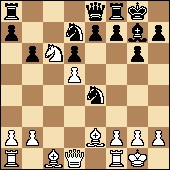
14.Re1 P.Svidler:
'Although the position does not look clear, the variations show that White has the upper hand.'
14...Ne5
|
| |
(14...f5 15.f3
Nec5 16.Bb5
Bf6 17.b4!
Bxa1 (17...a6
18.Nxe7+ Bxe7
19.bxc5 bxc5
20.Bc6 Ra7
21.Qe2) 18.bxc5
Be5 19.cxd6
exd6 (19...Bxd6
20.Nxe7+ Bxe7
21.d6) 20.f4
a6 21.Bf1 ) ) |
|
15.Bb5
|
| |
(15.Bf3 Nc5
16.Bg5 Nxc6
17.dxc6 Ne6 ) ) |
|
15...a6
|
| |
(15...f5 16.Nxa7
Qf7 17.Nc6 ) ) |
|
16.Nxe5
|
| |
(16.Ba4 b5 (16...Nc5
17.f4! Nxa4
18.fxe5 Nc5
19.Bg5!? (19.exd6
e5 20.b4 Nb7
21.Be3 Nxd6
22.Bxb6 ) 19...e6 (19...f6
20.exf6 Bxf6
21.Bxf6 Rxf6
22.Rxe7 Qc8
23.b4 ) 19...e6 (19...f6
20.exf6 Bxf6
21.Bxf6 Rxf6
22.Rxe7 Qc8
23.b4 ) 20.Be7 ) 20.Be7 ) 17.Rxe4
bxa4 (17...Nxc6
18.dxc6 bxa4
19.Qxa4 d5
20.Re2 Rc8
21.Rc2 ) 17.Rxe4
bxa4 (17...Nxc6
18.dxc6 bxa4
19.Qxa4 d5
20.Re2 Rc8
21.Rc2 ) 18.Qxa4
e6! ) 18.Qxa4
e6! ) ) |
|
16...Qxb5 17.Nc6
Nf6 18.a4
Qc4 19.b3
Qh4
|
| |
(19...Qc3 20.Ba3 ) ) |
|
20.Nxe7+ Kh8
21.Bb2 Rae8
22.Rc1 ] ] |
10.Nxe4 Bxe4
11.Ng5
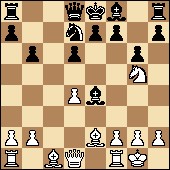
d5 P.Svidler:
'This is actually the only move, which proves that Black probably shouldn't have accepted the pawn sac.' P.Svidler:
'This is actually the only move, which proves that Black probably shouldn't have accepted the pawn sac.'
|
|
[11...Bb7? 12.Bc4
e6
|
| |
(12...d5 13.Qf3 ) ) |
|
13.Bxe6!
|
| |
(13.Re1 d5 (13...h6?
14.Nxe6 fxe6
15.Qg4 Qc8
16.Bxe6 Kd8
17.Qxg6 (13...h6?
14.Nxe6 fxe6
15.Qg4 Qc8
16.Bxe6 Kd8
17.Qxg6 ) (13...Be7?
14.Bxe6 fxe6 (14...Bxg5
15.Bd5+ Kf8
16.Bxb7 Rb8
17.Bc6 ) (13...Be7?
14.Bxe6 fxe6 (14...Bxg5
15.Bd5+ Kf8
16.Bxb7 Rb8
17.Bc6 ) 15.Nxe6
Qc8) 14.Qf3
Qf6! (14...Qe7
15.Bb5 Bg7 (15...Rd8
16.Qh3! a6
17.Nxe6 fxe6
18.Rxe6 axb5
19.Bg5 ) 15.Nxe6
Qc8) 14.Qf3
Qf6! (14...Qe7
15.Bb5 Bg7 (15...Rd8
16.Qh3! a6
17.Nxe6 fxe6
18.Rxe6 axb5
19.Bg5 ) 16.Qh3
Bxd4 (16...O-O-O 17.Bf4 ) 16.Qh3
Bxd4 (16...O-O-O 17.Bf4 ) 17.Nxe6
Bxf2+ 18.Kxf2
fxe6 19.Qxe6 (19.Rxe6
O-O+) 19...Rf8+
20.Kg3 Qxe6
21.Rxe6+ Kd8 (21...Kf7
22.Bxd7 Rad8
23.Rd6 Ke7
24.Bc6 ) 17.Nxe6
Bxf2+ 18.Kxf2
fxe6 19.Qxe6 (19.Rxe6
O-O+) 19...Rf8+
20.Kg3 Qxe6
21.Rxe6+ Kd8 (21...Kf7
22.Bxd7 Rad8
23.Rd6 Ke7
24.Bc6 ) 22.Bg5+
Kc7 23.Rc1+
Nc5 24.b4 ) 22.Bg5+
Kc7 23.Rc1+
Nc5 24.b4 ) 15.Bxd5
Qxf3 16.Bxf3
Bxf3 17.Nxf3
Nf6 ) 15.Bxd5
Qxf3 16.Bxf3
Bxf3 17.Nxf3
Nf6 ) ) |
|
13...fxe6 14.Nxe6
Qh4 P.Svidler: 'is the most stubborn,
but it doesn not save the game:'
|
| |
(14...Qe7 15.Re1 ) ) |
|
|
| |
(14...Qc8 15.Re1
Kf7 (15...Be7
16.Bg5 Bxg5
17.Nxg5+ Kf8
18.Rc1 Qb8
19.Qg4 ) 16.Qb3
d5 17.Qf3+
Nf6 (17...Kg8
18.Ng5 ) 16.Qb3
d5 17.Qf3+
Nf6 (17...Kg8
18.Ng5 ) 18.Bg5
Be7 19.Rac1
Bc6 P.Svidler: 'and now White wins by
a very peculiar-looking move' ) 18.Bg5
Be7 19.Rac1
Bc6 P.Svidler: 'and now White wins by
a very peculiar-looking move'
20.Ng7! Rf8 (20...Qd7
21.Bxf6 Bxf6
22.Re6 ) 21.Re6
Qd8 22.Rcxc6
Kxg7 23.Qe3! ) 21.Re6
Qd8 22.Rcxc6
Kxg7 23.Qe3! ) ) |
|
15.Re1
|
| |
(15.Bg5 Qe4
16.Nc7+ (16.d5
Kf7) 16...Kf7
17.Qb3+ d5
18.Rae1 Qf5 (18...Qxd4
19.Qf3+ Kg8 (19...Nf6
20.Ne6 Qxb2
21.Re2 Qxe2
22.Qxe2 Re8
23.Re1 Bc8
24.Bxf6 Rxe6
25.Be5 ) 20.Nxa8
Bxa8 21.Re8 ) 20.Nxa8
Bxa8 21.Re8 ) 19.Nxa8 (19.f4
Rc8 20.Re5
Nxe5 21.fxe5
Qxf1+ 22.Kxf1
Rxc7 ) 19.Nxa8 (19.f4
Rc8 20.Re5
Nxe5 21.fxe5
Qxf1+ 22.Kxf1
Rxc7 ) 19...Qxg5
20.Nc7 Bd6 ) 19...Qxg5
20.Nc7 Bd6 ) ) |
|
15...Be7 P.Svidler: but
|
| |
(15...Kf7 16.Bg5
Qh5 17.Qb3
d5 18.h3!! P.Svidler:
'(there's no defense against 19.g4)'
18...h6
19.g4 Qxg5
20.Nxg5+ hxg5
21.Qe3 ) ) |
|
16.Bg5! P.Svidler: 'wins very beautifully:'
|
| |
(16.Qb3 Qg4 (16...Rf8!?
17.Nxf8 Nxf8
18.Qb5+ Kf7 (18...Kd8
19.Rxe7) 19.Qc4+
d5 20.Qc7
Ba6 21.Bd2!
Qf6 22.Bb4
Ne6 23.Rxe6
Qxe6 24.Re1 ) (16...h6!?) (16...h6!? P.Svidler) 17.f3
Bxf3 (17...Qh4
18.Bg5 ) (16...h6!?) (16...h6!? P.Svidler) 17.f3
Bxf3 (17...Qh4
18.Bg5 ) 18.Qxf3
Qxf3 19.gxf3
Kf7 ) 18.Qxf3
Qxf3 19.gxf3
Kf7 ) ) |
|
16...Bxg5
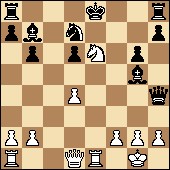
17.g3!!
Qh6 18.Nxg5+ Kf8
19.Qd2! Kg8
20.Re7 Bc6
21.Ne6!
18.Nxg5+ Kf8
19.Qd2! Kg8
20.Re7 Bc6
21.Ne6! ] ] |
|
|
|
[11...Bd5 12.Bf3
Bxf3 13.Qxf3
Nf6
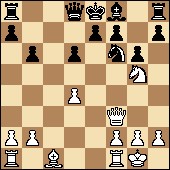
14.Qc6+
Nd7 P.Svidler: The game went on
15.Qd5
|
| |
(15.Re1 Bg7 (15...Rc8
16.Qf3 ) 16.Qxd6
Rc8 17.Qa3 (17.Bd2
Ne5! ) 16.Qxd6
Rc8 17.Qa3 (17.Bd2
Ne5! (17...Nf6
18.Rxe7+ Qxe7
19.Re1 (17...Nf6
18.Rxe7+ Qxe7
19.Re1 )) 17...Bxd4
18.Nf3 Bf6
19.Qxa7 Nc5
20.Qa3 O-O )) 17...Bxd4
18.Nf3 Bf6
19.Qxa7 Nc5
20.Qa3 O-O ) ) |
|
15...e6
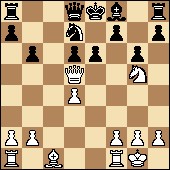
P.Svidler: ', and here Degraeve missed a very difficult but beautiful victory:'
16.Qf3 '!'
P.Svidler.
|
| |
(16.Nxe6 fxe6
17.Qxe6+ Be7 P.Svidler:
'is better. Two of three possible continuations lead nowhere.'
(17...Qe7
18.Qd5 Rb8! (18...O-O-O 19.Bg5 ) (18...Rc8
19.Bg5 Nf6
20.Qf3 Kf7
21.Rfe1 Qd8
22.Bxf6 Qxf6
23.Qd5+ Kg7
24.Qb7+ ) (18...Rc8
19.Bg5 Nf6
20.Qf3 Kf7
21.Rfe1 Qd8
22.Bxf6 Qxf6
23.Qd5+ Kg7
24.Qb7+ ) (18...Rd8
19.Bg5 Nf6
20.Qf3 Kf7
21.Rfe1 ) (18...Rd8
19.Bg5 Nf6
20.Qf3 Kf7
21.Rfe1 ) 19.Bg5
Nf6 20.Qb3! (20.Qf3
Kf7 21.Rfe1
Qd8 22.Rac1
Bg7 ) 19.Bg5
Nf6 20.Qb3! (20.Qf3
Kf7 21.Rfe1
Qd8 22.Rac1
Bg7 ) 20...Qf7 (20...Qg7
21.Rfe1+ Be7
22.Re6 ) 20...Qf7 (20...Qg7
21.Rfe1+ Be7
22.Re6 ) 21.Rfe1+
Be7 22.Re6!
O-O (22...Kf8
23.Bh6+ Ke8
24.Rae1 Ng8
25.Bg5 Rb7
26.Qd5 ) 21.Rfe1+
Be7 22.Re6!
O-O (22...Kf8
23.Bh6+ Ke8
24.Rae1 Ng8
25.Bg5 Rb7
26.Qd5 ) 23.Rxe7
Qxb3 24.axb3 ) 23.Rxe7
Qxb3 24.axb3 ) 18.Bg5! P.Svidler:
'wins by some very difficult tactics:' ) 18.Bg5! P.Svidler:
'wins by some very difficult tactics:'
(18.Bh6
Rc8 19.Rfe1
Rf8 (19...Nf8
20.Qd5 ) 20.Bxf8
Nxf8 ) 20.Bxf8
Nxf8 ) (18.Re1
Rf8 (18...Nf8
19.Qf6 ) (18.Re1
Rf8 (18...Nf8
19.Qf6 ) 19.Bg5
Rf7 20.Re3 (20.Qxd6
Rc8 21.Re2
Nf6 22.Qe6
Kf8 23.Rae1
Bb4 ) 19.Bg5
Rf7 20.Re3 (20.Qxd6
Rc8 21.Re2
Nf6 22.Qe6
Kf8 23.Rae1
Bb4 ) 20...Kf8
21.Bxe7+ Qxe7
22.Qd5 Qd8
23.Qxd6+ Kg8 ) 20...Kf8
21.Bxe7+ Qxe7
22.Qd5 Qd8
23.Qxd6+ Kg8 ) 18...Kf8 ) 18...Kf8 (18...Rf8
19.Bxe7 Qxe7
20.Qd5 (18...Rf8
19.Bxe7 Qxe7
20.Qd5 ) (18...Nf8
19.Qe4 Rc8 (19...d5
20.Qe5 Qd6
21.Rfe1 ) (18...Nf8
19.Qe4 Rc8 (19...d5
20.Qe5 Qd6
21.Rfe1 ) 20.Rfe1 (20.Rac1 P.Svidler 20...Rxc1
21.Rxc1 may be objectively better, but
the position after 21...Rd7 is very interesting in itself.) 20...Rc7
21.Rac1 Rd7! P.Svidler:
'Now all the normal moves do not succeed:' ) 20.Rfe1 (20.Rac1 P.Svidler 20...Rxc1
21.Rxc1 may be objectively better, but
the position after 21...Rd7 is very interesting in itself.) 20...Rc7
21.Rac1 Rd7! P.Svidler:
'Now all the normal moves do not succeed:'
(21...Rxc1
22.Rxc1 Kf7 (22...Rg8
23.Rc8 ) (22...d5
23.Qe5 Qd6
24.Re1 ) (22...d5
23.Qe5 Qd6
24.Re1 ) 23.Qf3+
Kg8 24.Qd5+
Kg7 25.Qb7
Nd7 26.Rc7 ) 23.Qf3+
Kg8 24.Qd5+
Kg7 25.Qb7
Nd7 26.Rc7 ) 22.Qf3! P.Svidler:
'is winning, although I admit I could not find it without Fritz.' ) 22.Qf3! P.Svidler:
'is winning, although I admit I could not find it without Fritz.'
(22.Rc8
Qxc8 23.Qxe7+
Rxe7 24.Rxe7+
Kd8 ) (22.Bf6
Kf7!! (22...d5
23.Qf4 Rg8
24.Bxe7 Rxe7
25.Rxe7+ Kxe7
26.Qg5+ Ke8
27.Qe5+ Kf7
28.Rc7+ Nd7
29.Qxd5+ ) (22.Bf6
Kf7!! (22...d5
23.Qf4 Rg8
24.Bxe7 Rxe7
25.Rxe7+ Kxe7
26.Qg5+ Ke8
27.Qe5+ Kf7
28.Rc7+ Nd7
29.Qxd5+ ) 23.Bxh8
Kg8 ' ) 23.Bxh8
Kg8 '
' P.Svidler.
24.Rc6
Kxh8 25.Qc2
Bg5 26.Rc8
Qf6) (22.Rc3
h6 23.Qc2 (23.Qh4
Rh7) (23.Bf6
Rh7 24.Qc2
Kf7 25.Rc8
Bxf6 26.Rxd8
Bxd8) 23...hxg5
24.Rc8 Qxc8
25.Qxc8+ Kf7 ) 22...h6
23.Bxe7 Rxe7
24.Rxe7+ Qxe7
25.Rc8+ Kd7
26.Qc6+ Ke6
27.Re8 ) 22...h6
23.Bxe7 Rxe7
24.Rxe7+ Qxe7
25.Rc8+ Kd7
26.Qc6+ Ke6
27.Re8 ) 19.Bh6+
Ke8 ) 19.Bh6+
Ke8
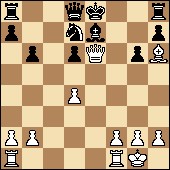
20.Rfe1 (20.Bg5 ) (20.Bg5 ) (20.Bg5 P.Svidler) 20...Rf8 P.Svidler) 20...Rf8 21.Bxf8 Nxf8
22.Qd5 Rc8
23.Re3 Rc7
24.Rae1
21.Bxf8 Nxf8
22.Qd5 Rc8
23.Re3 Rc7
24.Rae1 ) ) |
|
16...Nf6 17.Qc6+
Nd7 18.Qf3
Nf6 19.Qc6+
Nd7 20.Qf3 1/2-1/2
Degraeve-Bacrot, France 1996] |
|
12.Bb5
|
|
[12.Nxe4 dxe4
13.f3 e3
|
| |
(13...exf3 14.Bxf3
Rc8 (14...Rb8
15.Bf4 Rc8
16.Bb7 Rc4
17.Bd5 ) 15.Bb7
Rc7 16.Qf3
f6 17.Bc6 ) 15.Bb7
Rc7 16.Qf3
f6 17.Bc6 ) ) |
|
14.Bxe3 Bg7
15.Qd2 O-O 16.d5
Nf6 17.Rfd1
Ne8 18.Rac1
|
| |
(18.Bb5 Nd6
19.Bc6 Nc4
20.Qe2 Nxe3
21.Qxe3 Rc8 ) ) |
|
18...Nd6 ] ] |
|
12...Bg7
|
|
[12...a6 13.Bc6
|
| |
(13.f3 Bf5) |
|
13...Ra7
|
| |
(13...Rc8 14.Qa4
Bf5 15.Bxd5
e6 16.Bb7
Rc7 (16...Rxc1
17.Raxc1 Qxg5
18.Rc8+ Ke7
19.Bc6 b5
20.Qxa6 ) 17.Bxa6
Rxc1 18.Raxc1
Qxg5 19.Rc7
e5 20.f4 ) 17.Bxa6
Rxc1 18.Raxc1
Qxg5 19.Rc7
e5 20.f4 ) ) |
|
14.f3 Bf5
15.g4
|
| |
(15.Bxd5 e6
16.Bb3 Be7) |
|
15...h6
|
| |
(15...Qc7 16.Bxd5
e6 17.Bb3
h6 18.Nh3 ) ) |
|
|
| |
(15...Be6 16.Nxe6
fxe6 17.Qe2
Bg7 18.Qxe6
Bxd4+ 19.Kh1 ) ) |
|
16.gxf5
|
| |
(16.Nxf7 Kxf7
17.gxf5 gxf5
18.Bxd5+ e6
19.Bb3 Nf6 ) ) |
|
16...hxg5 17.fxg6
Qc7 18.Qc2
Bg7 19.Bxg5
Bxd4+ 20.Kh1 ] ] |
13.f3 P.Svidler: Then I realized
that 13.f3 leads to some very interesting and promising positions and decided that I should try and have
some fun. I know that it doesn't sound the way serious and professional chessplayers are supposed to
think during the game, especially if it's a game against the World Champion, but that's exactly what
I thought. And, after all, it worked.
|
|
[13.Nxe4 dxe4
14.Bc6 P.Svidler: 'Black is forced
to give up the exchange, but the position arising after'
14...O-O
|
| |
(14...Rc8 15.Qa4 ) ) |
|
15.Bxa8 Qxa8 P.Svidler:
'didn't look all that clear to me, thou White is, of coure, a bit better.'
16.Bg5
Nf6
|
| |
(16...Qd5 17.Bxe7
Re8 18.Ba3
Bxd4 19.Qe2!
Ne5 (19...e3
20.Kh1 ) 20.Rad1 ) 20.Rad1 ) ) |
|
17.Qe2 Qd5 ] ] |
13...Bf5
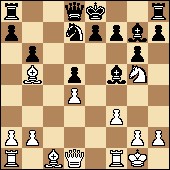
14.g4
h6
|
|
[14...Be6? 15.f4!
h6
|
| |
(15...a6 16.f5
Bxf5 17.gxf5
axb5 18.fxg6 ) ) |
|
16.f5 Bxf5
17.gxf5 hxg5
18.fxg6 fxg6
|
| |
(18...O-O 19.Bc6
Nf6 20.gxf7+
Rxf7 21.Bxa8
Qxa8 22.Bxg5 ) ) |
|
19.Bxg5
|
| |
(19.Qd3? Qc7!
20.Qxg6+ Kd8 ) ) |
|
19...Rh5 20.h4
Qc7 21.Qg4
Bxd4+ 22.Kh1 ] ] |
|
15.gxf5
|
|
[15.Nxf7 Kxf7
16.gxf5 gxf5
17.Bc6 Rc8
18.Bxd5+ e6
19.Bb3 Nf6 ] ] |
15...hxg5 16.fxg6
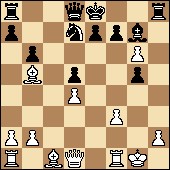
a6! P.Svidler:
'A very important finesse, which allows Black to unpin the knight on d7 at will.'
|
|
[16...fxg6 17.Bxg5 ] ] |
P.Svidler: As I've heard later, Kasparov said that it was obvious to him that I blundered
both 14...h6 and 16...a6. That's not exactly true. I've seen 14...h6 and had no doubt he will go for
it, and as for 16...a6, I was just waiting for him to make his mind, since it is a well-known fact that
a lot of precious time is wasted during the game on the moves which aren't played. So in some sense I
did blunder 16...a6, but the same applies to the manouevere 22. .Rh3 and 23...R8h4, which I didn't foresee
either.
17.gxf7+
|
|
[17.Ba4!? fxg6
|
| |
(17...Qc7 18.Rf2
Rh4 P.Svidler: 'is not good enough
in view of'
19.Be3! (19.Bxg5
Rxd4 20.Qe2
Qd6 21.Bc6 (21.Re1
e6 22.Qc2
Qb4 23.Bxd7+
Kxd7 24.Qe2
e5 25.gxf7
Rf8 ) 21...Ra7
22.Bxe7 Qxe7
23.Re1 Qxe2
24.Rfxe2+ Kd8
25.Re8+ Kc7
26.Bxd7 fxg6
27.Bf5 Kd6 (27...gxf5
28.R1e7+) 28.Bxg6
Rd2 ) 21...Ra7
22.Bxe7 Qxe7
23.Re1 Qxe2
24.Rfxe2+ Kd8
25.Re8+ Kc7
26.Bxd7 fxg6
27.Bf5 Kd6 (27...gxf5
28.R1e7+) 28.Bxg6
Rd2 ) 19...fxg6
20.Rc1) ) 19...fxg6
20.Rc1) |
|
18.Bxg5
|
| |
(18.Qd3 Qc7
19.Rf2 Qd6) |
|
18...b5 19.Bb3
Qb6 20.Bxd5
|
| |
(20.Be3 Qd6
21.Rf2 Rc8) |
|
20...Bxd4+ 21.Kh1
Rd8 ] ] |
|
17...Kxf7 18.Ba4
|
|
[18.Bc6 Qc7 ] ] |
18...Rh5?! P.Svidler: 'Appearance
does not deceive in this case- this strange-looking move is in fact quite bad.'
|
|
[18...Nf6 19.Be3
|
| |
(19.Bxg5? Qd6
20.Qe2 Rag8 ) ) |
|
19...Qd6 20.Qd2
Rh3 21.Rf2
Rah8 22.Raf1 P.Svidler:
', though I still prefer White.'] P.Svidler:
', though I still prefer White.'] |
|
|
|
[18...Qc7! 19.Rf2
Rh4 20.Be3
|
| |
(20.f4 g4) |
|
20...Rah8 P.Svidler: 'White can
go on in a very unclear position after'
P.Svidler: or agree on a draw by
playing
21.Rc1
|
| |
(21.Qd2 b5
22.Bc2!? '!?'
P.Svidler. '!?'
P.Svidler.
(22.Bb3 Nb6) (22.Bc2!? P.Svidler with
the idea to meet
22...Nb6 with 23.b3)) |
|
21...Rxh2 22.Rxc7
Rh1+ 23.Kg2
R8h2+ 24.Kg3
Rh3+ 25.Kg4
Rh4+ 26.Kxg5?? Bf6+
27.Kf5 e6#]
26.Kxg5?? Bf6+
27.Kf5 e6#] |
19.Be3 P.Svidler: 'A good solid move,
but White could also call Black's bluff and play'
|
|
[19.Bc6 Qh8
20.Qe2! P.Svidler: 'a move I underestimated
during the game'
20...Bxd4+ 21.Kh1
Rd8
|
| |
(21...Nf6 22.Bxa8
Qxa8 ) ) |
|
22.Bxd5+ Kf8
23.Be6! /\
24.Bg4; 24.f4 P. Svidler: ', and White is better due to the threats of 24.Bg4 and 24.f4'] /\
24.Bg4; 24.f4 P. Svidler: ', and White is better due to the threats of 24.Bg4 and 24.f4'] |
19...Nf6 20.Qd2
Qd6 21.Rf2
Rah8
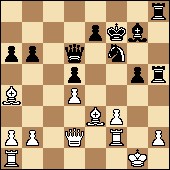
22.Rg2! P.Svidler:
'It was a this moment that I realized that my position must be better- Black has no serious play on the
K-side, while White has a wide range of targets- from g5 to a6.'
22...Rh3?! P.Svidler:
'The beginning of a suicide. After the normal'
|
|
[22...Bh6 23.Bc2
Rg8 24.Bd3! '!'
P.Svidler. P.Svidler: 'White is clearly better, but he's not at all winning.'] '!'
P.Svidler. P.Svidler: 'White is clearly better, but he's not at all winning.'] |
23.Rf1 R8h4?
24.Bc2 P.Svidler:
'And suddenly it's all over. There is no defense against 25.Bf5 or 25.Bxg5' P.Svidler:
'And suddenly it's all over. There is no defense against 25.Bf5 or 25.Bxg5'
24...Nh5
|
|
[24...e6 25.Bxg5
Bh6 26.Bxh6
Rxh6 27.Qg5
Rxh2 28.Qg7+
Ke8 29.Bg6+
Kd8 30.Qxf6+
Kc8 31.f4 ] ] |
|
25.Bf5 Nf4
26.Bxh3
|
|
[26.Bxf4 Qxf4
27.Qxf4 gxf4
28.Rd2 Bxd4+
29.Rxd4 Rxh2 P.Svidler:
', but I did not want to trade queens.'] P.Svidler:
', but I did not want to trade queens.'] |
26...Nxh3+ 27.Kh1
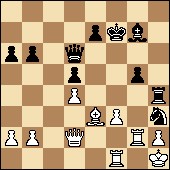
Qf6
|
|
[27...Bf6 28.Rg4
Rh5 29.f4 ] ] |
|
28.Rg3! Qf5
|
|
[28...Nf4 29.Rg4 ] ] |
|
29.Bxg5 Nxg5
|
|
[29...Rxd4 30.Qg2
Nxg5 31.Rxg5
Qf6 32.Rg1 ] ] |
30.Rxg5 Qh3
31.Rg2 '+-' P.Svidler. P.Svidler:
'There's no hope left for Black.'
31...Bf6
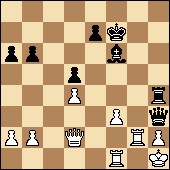
32.Qd3
Rxd4 33.Qg6+
Ke6 34.Qe8
Rc4
|
|
[34...Kd6 35.Qb8+
Kc6 36.Rc1+
Kb5 37.Qe8+
Ka5 38.a3
b5 39.b3 ] ] |
35.Qd8! P.Svidler: 'Cutting off the
King. '
35...Qf5 36.Re1+
Be5 37.Qb8 P.Svidler:
'And in view of inevitable 38.Rxe5 Qxe5 39.Rg6 Kf5 40.Rg5 Black resigned.'
|
|
[37.Qb8 Kf6
38.Qh8+ Ke6
39.Rxe5+ Qxe5
40.Rg6+ Kf5
41.Rg5+] |
1-0 |

